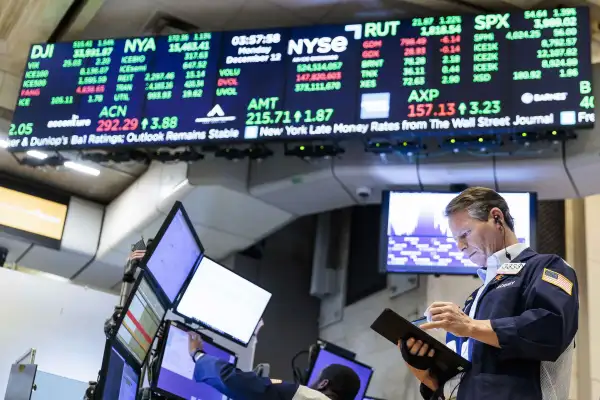Stocks Soar After Inflation Falls More Than Expected. Here's What's Next
Money is not a client of any investment adviser featured on this page. The information provided on this page is for educational purposes only and is not intended as investment advice. Money does not offer advisory services.

The stock market surged on Tuesday after a new report shows the pace of inflation continues to slow.
Data released by the Bureau of Labor Statistics shows that consumer prices rose 0.1% between October and November, down from a rate of 0.4% the previous month. On a yearly basis, prices are up 7.1%, compared to an annual rate of 7.7% in October. Both the monthly and the annual rate of inflation were less than experts predicted.
That better-than-expected news sent stocks soaring on Tuesday morning: The S&P 500 Index climbed 2.6% in early trading, while the Dow Jones Industrial Average gained 1.6% and the tech-heavy Nasdaq was up nearly 4%.
Some components of the Consumer Price Index (PCI) are still significantly more expensive than they were a year ago, including groceries and rent prices. Prices in other categories — like used cars and airline fares — are falling. Gas prices, which soared in the wake of this year’s war between Russia and Ukraine and were a major component of the inflation index, dropped between October and November but were still about 10% higher than they were last year.
Experts say the rate of inflation is likely to keep falling in 2023, which is good news for consumers who have seen their budgets stretched by a year of historic price growth.
Tuesday’s data comes as investors await a key decision about interest rates from the Federal Reserve on Wednesday afternoon. The central bank has been raising its benchmark rate for months in an attempt to bring inflation down to more manageable levels.
Inflation that's lower than expected "not only validates a Fed decision to slow the pace of rate hikes, it also raises hopes that the inflation surge may actually be tamed within the next 12 months," Seema Shah, chief global strategist at Principal Asset Management, said in email commentary shared with Money.
Most experts expect a rate hike of 50 basis points on Wednesday, which would be smaller than the series of 75 basis point increases we’ve already seen this year.
But investors shouldn't celebrate too early. In a market note on Monday, experts at BlackRock warned that the policy changes needed to bring inflation back down to the Fed's target level "would entail even deeper recessions" than many are predicting next year.
"Inflation still isn’t fully handled," writes Callie Cox, investment analyst at eToro, "and it’s easy for markets to get carried away. We may not see new highs until inflation is fully under control."
How Low Could Inflation Go in 2023? Here Are 4 Expert Predictions

